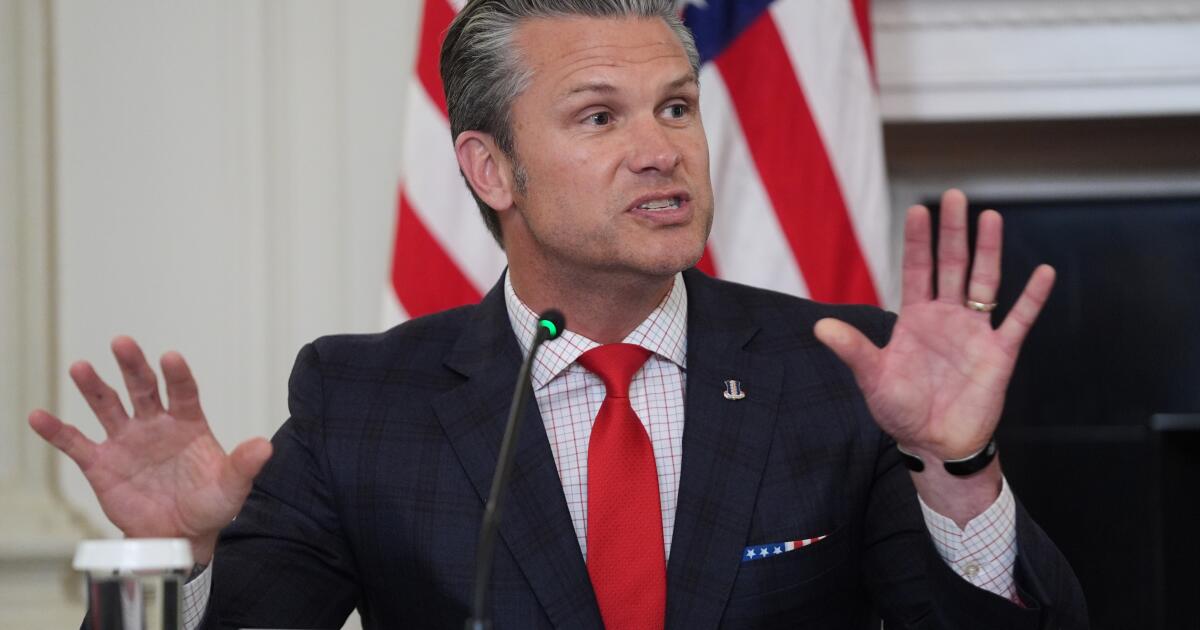Copyright The New Yorker

Donald Trump made gestures toward seeking a third term—before walking it back. What’s he up to? The legal writer Ruth Marcus joins Michael Luo to figure it out. Plus: Children are losing their civil-rights protections When a crackdown on the I.R.A. backfired Guillermo del Toro was born to make “Frankenstein” Michael Luo Executive editor Last Thursday, during an interview with The Economist, Steve Bannon, Donald Trump’s former White House chief strategist, asserted, “Trump is going to be President in ’28,” and alluded to “a plan” that would make this possible. On Monday, when asked about the possibility of a third term, Trump told reporters on Air Force One that he “would love to do it,” only to acknowledge on Wednesday, in another press gaggle, that “it’s pretty clear, I’m not allowed to run.” I decided to ask Ruth Marcus, one of the magazine’s legal writers, what she made of all the chatter about a third term. This conversation has been edited and condensed. Michael Luo: Ruth, you and I were together over the weekend for a panel at The New Yorker Festival, and you told me that Bannon’s musings about a third Trump term was, essentially, “crazy talk”—and now Trump seems to have conceded this. What do you think is going on here? Ruth Marcus: To be clear: it’s not crazy, in tactical, political terms, for Bannon to float this notion and for Trump, as he initially did, to fan the flames. It’s crazy to imagine that Donald Trump will be President on January 21, 2029, after his term is over and he is no longer constitutionally eligible for the office. So what was this fire drill all about? I’ll take off my lawyer hat and put on my political-pundit hat, and note that other Presidents in their second terms, before and after the Twenty-second Amendment, have chafed at the idea that they’re time-limited, by norm or by law, and that they are therefore lame ducks. For Trump, keeping the hope of a third term alive has multiple benefits. It energizes a base that loves the idea. It keeps him relevant for longer. And it drives the left bonkers to see “Trump 2028” hats on the Resolute desk—which, from Trump’s point of view, is a good in itself and also serves as a useful distraction mechanism. I mean, shouldn’t we be having a highfalutin conversation about the legality of blowing up alleged drug traffickers? We should—but Trump would probably rather distract us. M.L.: Do you think the door has now closed on Trumpworld making a go of this? Is there a scenario in which you see Trump allies still attempting this? R.M.: I think the door’s pretty firmly shut. The House Speaker, Mike Johnson, who’s not exactly a stiff-spine guy when it comes to Trump, said he didn’t see a constitutional path to a third term, as much fun as Trump is having, in Johnson’s words, “trolling the Democrats.” But here’s the theory, such as it is. The Twenty-second Amendment was ratified in 1951, after Franklin Roosevelt had broken with the norm that Presidents would not serve more than two terms; F.D.R. died in office, shortly into his fourth term. The Amendment provides, “No person shall be elected to the office of the President more than twice.” Note that it says “elected . . . more than twice,” not “serve as President for more than two terms.” The way—maybe—to get around that would be to have Trump elected Vice-President, and then to have whoever is the incumbent President resign to make way for a third Trump term. (Trump himself, by the way, said that this approach was “too cute,” and that “the people wouldn’t like that.”) Alternatively, and even more fancifully, Trump could be elected Speaker of the House (you don’t have to be a House member to be Speaker), putting him in line for the Presidency, and both the elected President and Vice-President would clear the decks for him. M.L.: So it’d have to be an end run? There’s no scenario in which Trump contests and wins the Republican primary, and he actually gets on the general-election ballot? Democrats would then file a lawsuit, and the case winds up before the Supreme Court, which somehow reads the Twenty-second Amendment differently than it has been widely understood? R.M.: I don’t think it would play out that way. If Trump decided to throw his hat in the ring and run in the primaries, secretaries of state, depending on the wording of individual states’ election laws, would have the power to exclude him from the ballot because of his evident ineligibility. Of course, he could sue, and we could end up with a ruling on the meaning of the Twenty-second Amendment. Or a Republican voter might have standing to challenge Trump’s eligibility for being on the primary ballot. Recall the litigation over whether Trump could be disqualified from state ballots as an insurrectionist. A different constitutional provision but the same concept of eligibility. So imagine, one way or another, in the primary campaign or a general-election campaign, the case gets to the Supreme Court. Without the end run, a bid to be elected to a third term would directly contravene the Twenty-second Amendment. I happen to have just read Justice Amy Coney Barrett’s new book, and her description of the amendment is clear: it “limits presidents to two four-year terms.” M.L.: But haven’t we been here before? There are many, many things that have taken place during this second Trump term which were previously unimaginable. And we have a Supreme Court that has given him immunity from prosecution. He has now walked things back, but we all know that he changes his mind constantly. It’s almost like he’s testing the limits of how far he can go. He clearly would like to stay in office . . . R.M.: It is certainly true that this Court has granted power to the President that is far beyond what I anticipated and what I think is wise. But this kind of blank check to rewrite the clear language of the Constitution would go so far beyond anything the conservative majority has done that it remains unimaginable, certainly unimaginable that there could be five votes. I mean, what comes next—they declare Barron Trump to be eligible for President even though he’s younger than the constitutionally mandated thirty-five years? We are living through what many of us see as a catastrophe, but we also can’t succumb to the temptation to catastrophize. Some unimaginable things remain unimaginable, and I would put a third term in that category. M.L.: O.K., got it. Hopefully, in 2028, we’ll be able to look back on this little conversation and laugh about it. R.M.: Well, you’re either going to be laughing with me or at me. Or, if I’m wrong, maybe not laughing at all. Editor’s Pick When the Government Stops Defending Civil Rights Shortly after Trump was inaugurated, the Department of Education froze investigations into thousands of cases of alleged race and sex discrimination. And then, earlier this month, hundreds of employees in the part of the agency that evaluates such cases were laid off. The Administration’s decisions have effectively transported parents back in time, Eyal Press argues, to the era before the 1964 Civil Rights Act. Read the story » More Top Stories In Guillermo del Toro’s “Frankenstein,” a Vast Vision Gets Netflixed Down to Size When a Crackdown Involving the I.R.A. Backfired, Comically, in “The Ban” Our Culture Picks Read: In the memoir “Paper Girl,” Beth Macy sets out to understand exactly how Trump’s Presidency fragmented the nation. Watch: “Down Cemetery Road” is now available to stream on Apple TV. Emma Thompson stars as a private investigator hired to look for a missing child—she’s come a long way from her early days in comedy. Listen: With last week’s release of the fiery “West End Girl,” Lily Allen might have set the tone for the season. Daily Cartoon Puzzles & Games Today’s Crossword Puzzle: Bit of madcap behavior—five letters. Laugh Lines: Test your knowledge of classic New Yorker cartoons. Name Drop: Guess the identity of a notable person in six clues. P.S. Cameron Crowe’s new memoir, “The Uncool,” tracks his adolescent days in the nineteen-seventies as the Doogie Howser of music journalists. Gene Simmons, of Kiss, recalled being interviewed by Crowe back then, telling The New Yorker, “When we met Cameron, the immediate reaction was ‘Where’s your dad or your mom?’ ” 🤘 Erin Neil and Ian Crouch contributed to today’s edition.



